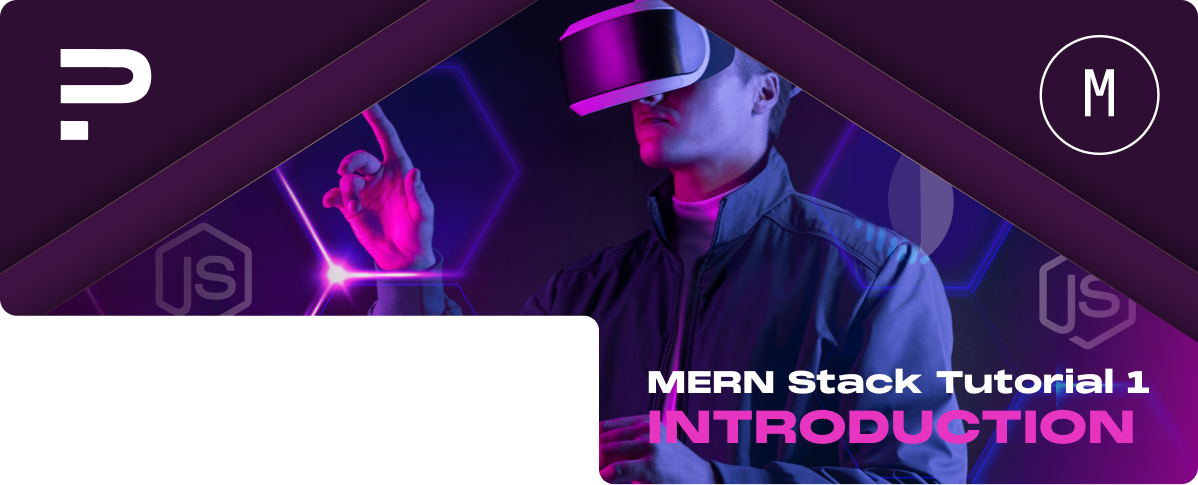What is the MERN Stack?
The MERN stack is a popular set of technologies used for building dynamic websites and full-stack web applications. It is an acronym that stands for MongoDB, Express.js, React.js, and Node.js.
The stack combines a document-oriented database (MongoDB), a server-side web framework (Express.js), a client-side web framework (React.js), and a runtime environment (Node.js) to allow developers to build and run applications using JavaScript on both the client and server sides.
- MongoDB: A NoSQL database that stores data in flexible, JSON-like documents. It’s designed to handle large volumes of data and allows for easy scalability.
- js: A web application framework for Node.js. It simplifies server-side logic and routing, making writing secure, modular, and fast applications easier.
- js: A front-end JavaScript library developed by Facebook for building user interfaces. It enables developers to create fast, interactive UIs in a declarative manner.
- js: A JavaScript runtime built on Chrome’s V8 JavaScript engine. It allows developers to use JavaScript for server-side scripting—running scripts server-side to produce dynamic web page content before the page is sent to the user’s web browser.
The MERN stack is popular among developers for its ease of use, flexibility, power of JavaScript, and strong community support each of its technologies enjoys. It enables developers to build a wide range of web applications, from small personal projects to large-scale enterprise solutions, using a single, cohesive technology stack.
Understanding Each Component of the MERN Stack
MongoDB
Introduction to NoSQL databases
Unlike traditional relational databases, NoSQL databases, like MongoDB, store data in a format similar to JSON documents. This model provides data storage flexibility, allowing for data structure changes without affecting existing data.
NoSQL databases are designed to handle large volumes of data and support rapid development, making them ideal for modern web applications that require scalability and speed.
Why MongoDB for modern web applications?
MongoDB’s document-oriented approach aligns well with the object-oriented programming used in modern web development, allowing for an intuitive data-handling process. Its scalability, flexibility in handling diverse data types, and powerful query language make it a top choice for developers looking to build dynamic, high-performance web applications.
Express.js
The role of Express.js in web development
Express.js is a web application framework for Node.js, providing a robust set of features to develop web and mobile applications. It facilitates the rapid development of server-side applications by easily handling HTTP requests and middleware.
How Express.js simplifies backend development
Express.js simplifies the task of building server-side logic by providing a lightweight framework that streamlines the process of routing and handling web requests. It allows developers to write cleaner, modular code, making the development process more efficient and manageable.
React.js
Basics of React.js and its importance in the MERN stack
React.js is a JavaScript library for building user interfaces, particularly known for its component-based architecture. It enables developers to create reusable UI components that manage their state, leading to efficient updates and rendering of dynamic data. React’s importance in the MERN stack lies in its ability to develop complex, interactive web applications with high performance and user experience.
Single Page Applications (SPA) and React.js
SPAs are web applications that load a single HTML page and dynamically update content as the user interacts with the app without reloading the page. React.js is particularly suited for building SPAs because of its efficient update and rendering system, which ensures a smooth user experience even in complex applications.
Node.js
Introduction to server-side JavaScript with Node.js
Node.js is a runtime environment that allows for the execution of JavaScript code on the server side. It’s built on Chrome’s V8 JavaScript engine, providing a fast execution environment that efficiently handles asynchronous operations and I/O-intensive tasks.
How Node.js complements Express.js for server-side development
Node.js and Express.js work together seamlessly to create a robust server-side solution. Node.js handles the execution of JavaScript code, while Express.js provides the framework for routing and middleware. This combination allows for the development of fast, scalable, and efficient backend services that support modern web applications’ complex functionalities.
Why Choose MERN Stack?
The MERN stack is a compelling choice for modern web development due to its cohesive use of JavaScript across the entire development stack, robust community support, and flexibility. Here’s a closer look at why developers opt for the MERN stack for their projects.
Full-stack JavaScript Development
One of the most significant advantages of the MERN stack is its uniform use of JavaScript for both client-side and server-side development. This consistency simplifies the development process, allowing developers to use a single programming language throughout their projects.
It eliminates the need to switch contexts between different languages for front-end and back-end development, enhancing developer productivity and making the stack particularly appealing to those already proficient in JavaScript.
Community Support and Ecosystem
Each technology within the MERN stack enjoys strong community support and a rich ecosystem of tools and libraries:
- MongoDB offers extensive documentation, a wide array of tools for database management, and a supportive community for developers.
- Express.js is backed by numerous middleware modules that simplify the implementation of various web application features.
- React.js benefits from Facebook’s active development and a vast collection of reusable components and hooks that accelerate UI development.
- Node.js has a large and active community, contributing to its comprehensive npm registry, which is the largest ecosystem of open-source libraries in the world.
This vibrant ecosystem provides many resources and tools and ensures developers have access to support and new developments within the stack.
Flexibility and Efficiency in Development
The MERN stack offers great flexibility in how applications are structured and built. Developers can easily integrate other tools, libraries, and frameworks to tailor the stack to their specific project needs. This adaptability, combined with the efficiency gained from a JavaScript-centric development approach, makes the MERN stack suitable for many projects, from small startups to large-scale enterprise applications.
Real-world Applications of MERN Stack
The MERN stack is versatile enough to build various types of applications, including but not limited to:
- Social Media Platforms: Leveraging the real-time data processing capabilities of Node.js and the dynamic UIs of React.
- E-commerce Sites: Utilizing the flexibility of MongoDB for product data management and Express.js for handling transactions securely.
- Blogs and Content Management Systems: Benefiting from React’s component-based architecture for customizable layouts and MongoDB’s schema-less nature for diverse content types.
- Interactive Web Applications: Taking advantage of React’s efficient update and rendering system for highly interactive and responsive user interfaces.




































